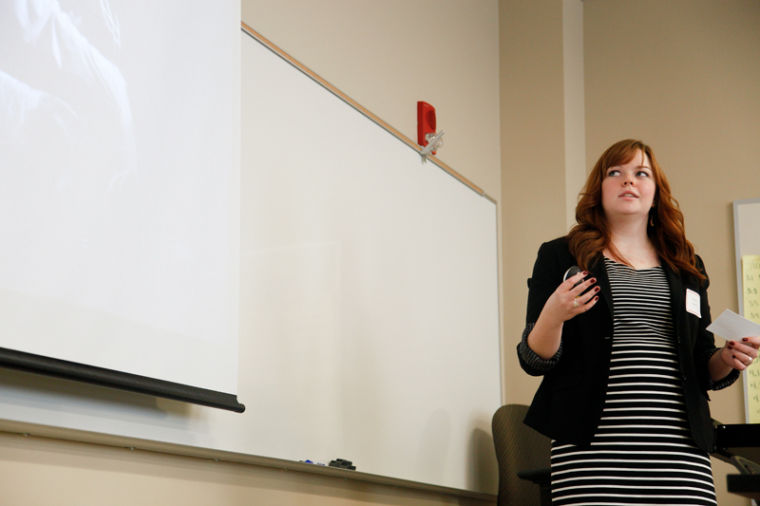Student presented musical-themed research at conference
March 26, 2013
The Student Research Conference was more than a series of presentations, but rather a showcase of students’ passions and hard work.
One of those students is WKU junior Brenna Sherrill who presented her research on the musical “Jesus Christ Superstar” and religion in America in the 1970s.
Not only did Andrew Lloyd Webber and Tim Rice’s musical, “Jesus Christ Superstar,” impact pop culture in the 1970s, but it also had special significance for Sherrill’s family.
“When my grandfather decided to play a record of the musical in the church he was a pastor of in New Jersey, it caused a huge controversy at the time and was even given some attention to by the press,” Sherrill said.
The decision to choose this topic was easy for Sherrill due to the musical’s connection to her family.
Sherrill’s mother, Katrina Eicher, professor of communication and theatre at Elizabethtown Community and Technical College, expressed how influential the play is with their family.
“Dad fell in love with Jesus Christ Superstar,” Eicher said. “It was the first rock and roll music in the house.”
It was not only Sherrill’s grandfather that fell in love with the play.
“Brenna and I listen to Jesus Christ Superstar every year on Good Friday,” Eicher said.
Although Sherrill is familiar with Jesus Christ Superstar, her research also includes modern American religion and the counterculture of the 1960s and 1970s.
Sherrill’s advisor, associate professor Tony Harkins, was impressed with her topic.
“I think it was a little more original,” Harkins said. “I like the way it considered religion and the way it related to pop culture.”
Sherrill’s goal with her research was to find the connection between the three different elements of the musical, the church and the counterculture. Part of Sherrill’s required research included finding primary sources.
“The best way to understand something is to do primary research,” Harkins said.
For Sherrill, primary research included looking at music and reviews of Jesus Christ Superstar which debuted in 1971. The task of completing primary research was not always easy.
“What I was looking for wasn’t always there,” Sherrill said.
From this experience of researching and putting together her presentation, Sherrill hopes to gain practice for presenting her Honors thesis over the literary merit of the Harry Potter series and its Christian symbolism.
Sherrill’s family has been involved with her efforts for presenting at the Student Research Conference.
Sherrill’s uncle sent her a book written in 1972 about the musical, although after the paper was completed.
Sherrill and her mother worked together on creating a PowerPoint and practicing Sherrill’s presentation.
“You can’t just read the paper,” Eicher said.
From Sherrill’s grandfather and his controversial use of Jesus Christ Superstar in church to Sherrill’s interest in the play which lead her to the Student Research Conference, this musical has come full circle.




















![Megan Inman of Tennessee cries after embracing Drag performer and transgender advocate Jasmine St. James at the 9th Annual WKU Housing and Residence Life Drag Show at Knicely Conference Center on April 4, 2024. “[The community] was so warm and welcoming when I came out, if it wasn’t for the queens I wouldn’t be here,” Inman said.](https://wkuherald.com/wp-content/uploads/2024/04/smith_von_drag_3-600x419.jpg)


